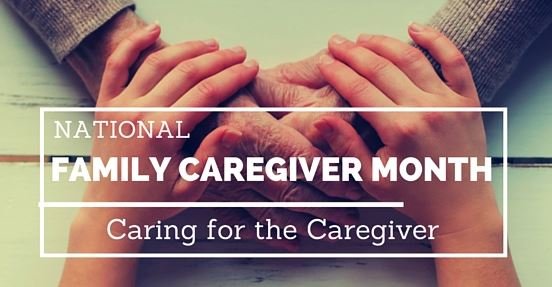November is National Family Caregivers Month. This is the time recognition is given for all those who are caregivers and who play a role in supporting and caring for other family members who may have a physical disability or other impairments that impact their ability to care for themselves. According to a proclamation issued by the White House in October, it is estimated that more than 40 million people in the US are unpaid caregivers. Eighty percent of adults requiring long-term care currently live at home in the community, and unpaid family caregivers provide 90% of their care. Family caregivers serve as a critical extension of the U.S. healthcare system, and the demand for family caregivers is expected to increase during the next few decades. Caring for loved ones is associated with several benefits, including personal fulfillment; however, caregiving is also associated with physical, psychological, and financial burdens.
This month we want to share with our employees about one of CSG’s services, known as CAPS or the Caregiver Assessment and Planning Service. Recognizing the unique needs of older adult caregivers of individuals with intellectual and developmental disabilities, Lancaster County Behavioral Health and Developmental Services (BHDS) issued a request for proposals in November 2018 to partner in the development and implementation of an innovative assessment program. The program would be designed to reduce individual and family/caregiver stress by planning for emergency situations. The program specifically targeted caregivers over the age of 60 providing care to their adult child. Always eager to develop services to meet the needs of others, CSG responded to the request for proposals and was selected to provide this new service. CAPS became operational in the summer of 2019. The CAPS program is designed to assess older caregiver stability in their current role of providing support/s to adult individual/s with ID; develop a comprehensive plan for the continuation of care for the person with ID in the event of the incapacitation of the caregiver/s; and recommend community-based resources to help support the caregiver/s in their role.
Kelly Fisher, who has been with CSG since 1989, is the Caregiver Assessment Coordinator for CAPS, working with Susan Martinko the Director of IDD Services for Lancaster County. Dr. Kelly Carney, a licensed psychologist specializing in services for older adults, is the consultant to our program. Kelly Fisher currently works with six families or individual caregivers, and has supported 18 clients since the program began. Kelly has shared one of her success stories to explain what she does in her role:
“One of the first referrals was a couple. A husband and wife. The husband is considered the caregiver and he is several years older than his wife, who was actually in our apartment program almost 40 years ago when they started dating. They live on a fixed income which is very limited. It had been suggested that he might be showing signs of dementia. The husband has always taken the lead in terms of managing everything to do with their lives such as paying bills, getting medication refills, etc. Their primary concerns were how to assure the wife would be ok in the short-term should anything happen to the husband, finding affordable legal help to prepare living wills, and finding reliable help with filling medication minders. We recommended that he teach her about the bill paying process, because, truth be told, he had developed some short cuts. For example, his way of paying the bills is to go to the bank, give a familiar teller the bills and have the teller make out the checks for him, so having the wife do the same was very feasible. We also got them to set up prepared dose prescription delivery which eliminated the need for weekly help from a home health agency, which had been inconsistent. Several months ago, the husband had to be hospitalized which put things to the test. As it turned out, the wife was able to take care of the things she had simply relied upon her husband to take care of for the past 38 years. We were also able to find a very affordable, little known resource for legal help through the Office of Aging.”



